Every month, we pick a few topics for exploration. The topics we select aren’t meant to cover every issue area facing the progressive community, but rather to give actionable advice on how to talk about key issue areas. This month we focused on:
How do progressives build momentum for action on climate change?
Advocates for climate action should highlight the “strange and severe” weather-related consequences of climate change, our obligation to future generations, and politicians’ fealty to big oil companies.
How do progressives fight back against charges of “socialism”?
Most Americans dislike “socialism,” but progressives can effectively counter “socialist” attacks by pointing to conservatives’ harmful agenda or their history of using the word to smear popular progressive programs.
1 | Reacting to Climate Change
Americans are seeing the early signs of climate change and connect this with a need for action.
The consequences of climate change are becoming increasingly difficult to ignore: 72% think it is either a dangerous problem for people today (22%) or one that needs to be addressed today in order to prevent it from becoming dangerous in the future (50%).
There remain major differences in how the public views the issue, largely correlated with partisan affiliation. Fifty-three percent (53%) of Americans overall think the climate is changing mostly as a result of human activity, driven largely by Democrats (83%) and independents (48%) who believe this is this case. This compares to just 31% who say it is a result of natural patterns in the environment, coming largely from a majority of Republicans (60%) and a much smaller segment of independents who agree (27%). This fractured – but lopsided – political balance may explain why Americans are more likely to trust Democrats in Congress over their Republican counterparts to protect the environment (by a 32-point margin), address climate change (by a 32-point margin), and make sure our air is breathable and our water is clean (by a 26-point margin).
Conservatives seem to be rallying around attacks on progressive policy positions on climate change, but Americans decisively side with progressive arguments for climate action over attacks against proposals like the Green New Deal.
Against the typical arguments against climate action and against the Green New Deal, every one of the progressive arguments tested in this edition of Navigator wins by a clear margin – even among white non-college voters.
The strongest progressive argument links the climate consequences of today to the implications for future generations.
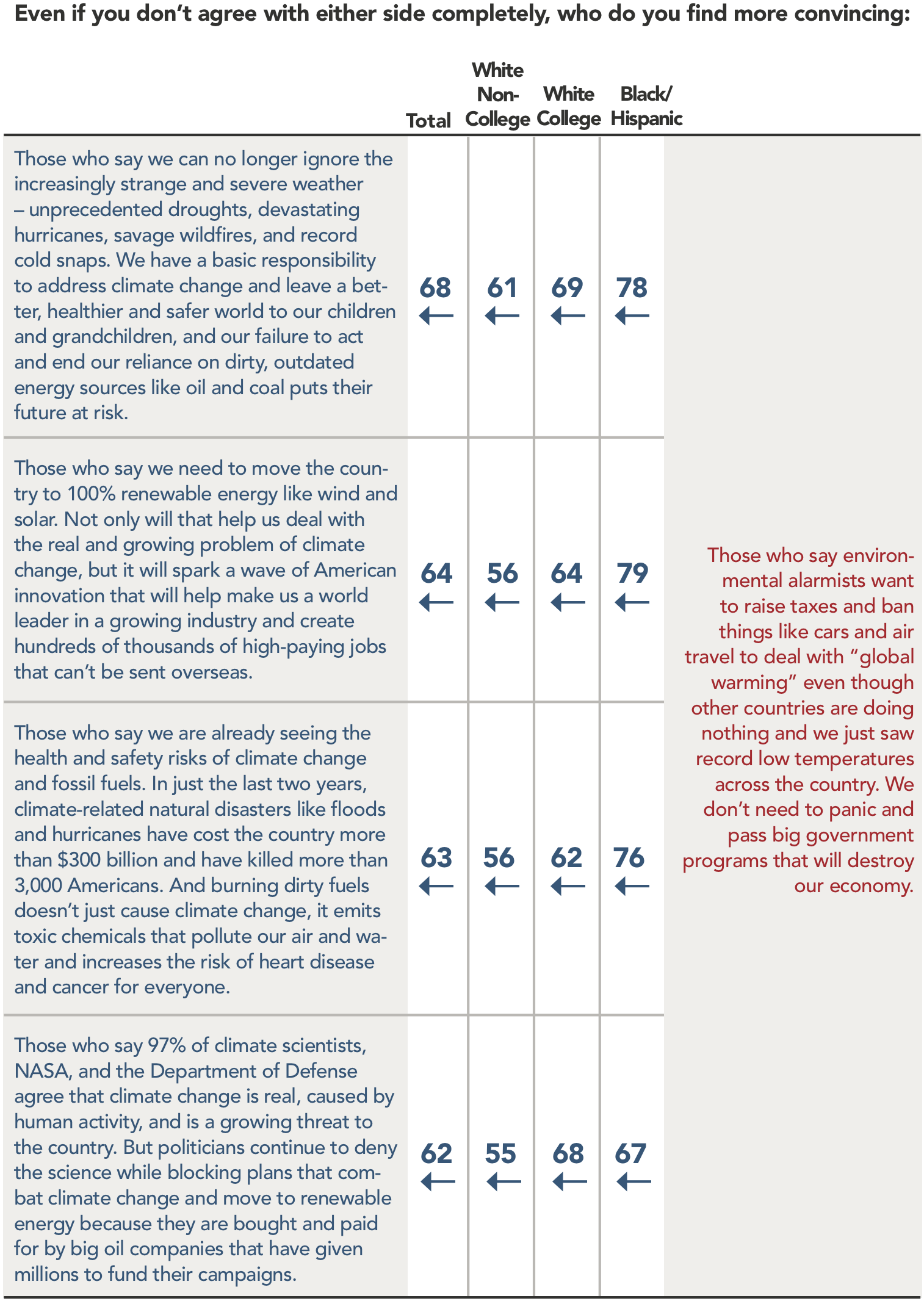
Count to 10
While 37% say climate change already poses a “very serious” problem today, the intensity increases by roughly 10 points when the time horizon is expanded to the next 10 or 25 years. An important note for communicators: there is no need to push the horizon to 25 years. In a split-sample experiment, either a 10-year or a 25-year horizon lead to the same increase in very serious concern.
Big Oil vs. Radical Environmentalists
While there are several effective arguments to counter opposition to climate action, it is clear a key driver for progressive communications should be to focus on the motivations of political leaders standing in the way. Specifically, when asked to select from a list of possible reasons why political leaders don’t do more, 47% of respondents say that “they are in the pockets of big oil companies and other corporations that profit from the burning of fossil fuels” above all others. Only 33% say these political leaders have genuine doubts about climate change.
Moreover, Americans are specifically more concerned about “Republicans and big oil and coal companies working together to deny climate change” compared to “Democrats and radical environmentalists” exaggerating the problem to impose costly government programs by a 47% to 32% margin. Among independents, the margin is a lopsided 43% to 18%.
Language to Describe Climate Action
Asked what kind of approach our political leaders should take on climate change, the most popular view is to be more “thoughtful” and “innovative.”
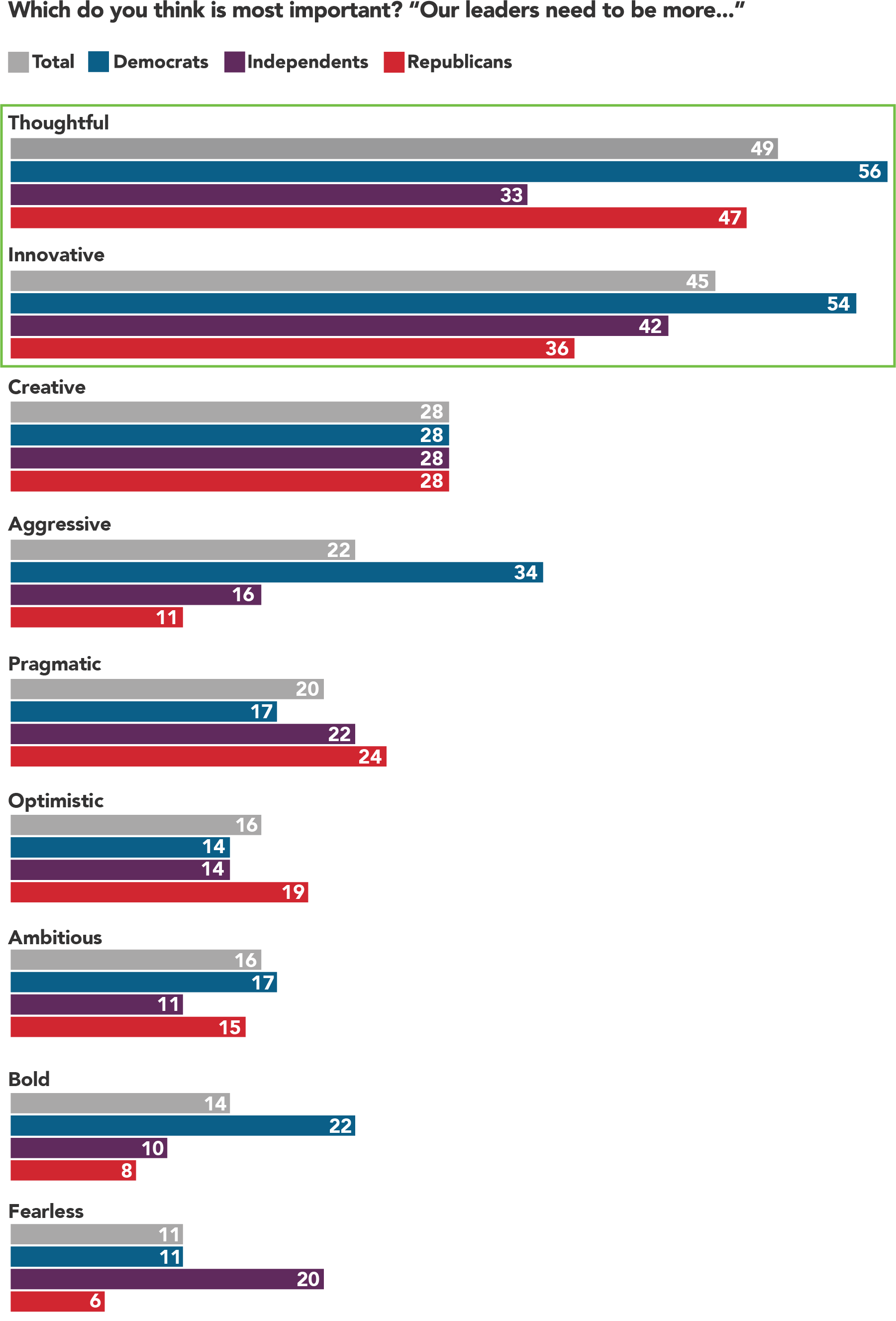
Americans will respond best when leaders focus on the direct consequences of climate change.
Besides specifically countering the attacks, many progressives will also want to continue building the positive case for urgent climate action. Navigator finds five statements about the risks from climate change elicit significant concern with majorities of the American public, while three others are less impactful.
The more worrisome narratives mostly point to weather-related consequences: droughts that worsen wildfires, storms that damage property and endanger lives, and rising seas that increase flood risks.
Americans are less responsive to less direct effects like climate change causing problems that then lead to future national security challenges and job losses.
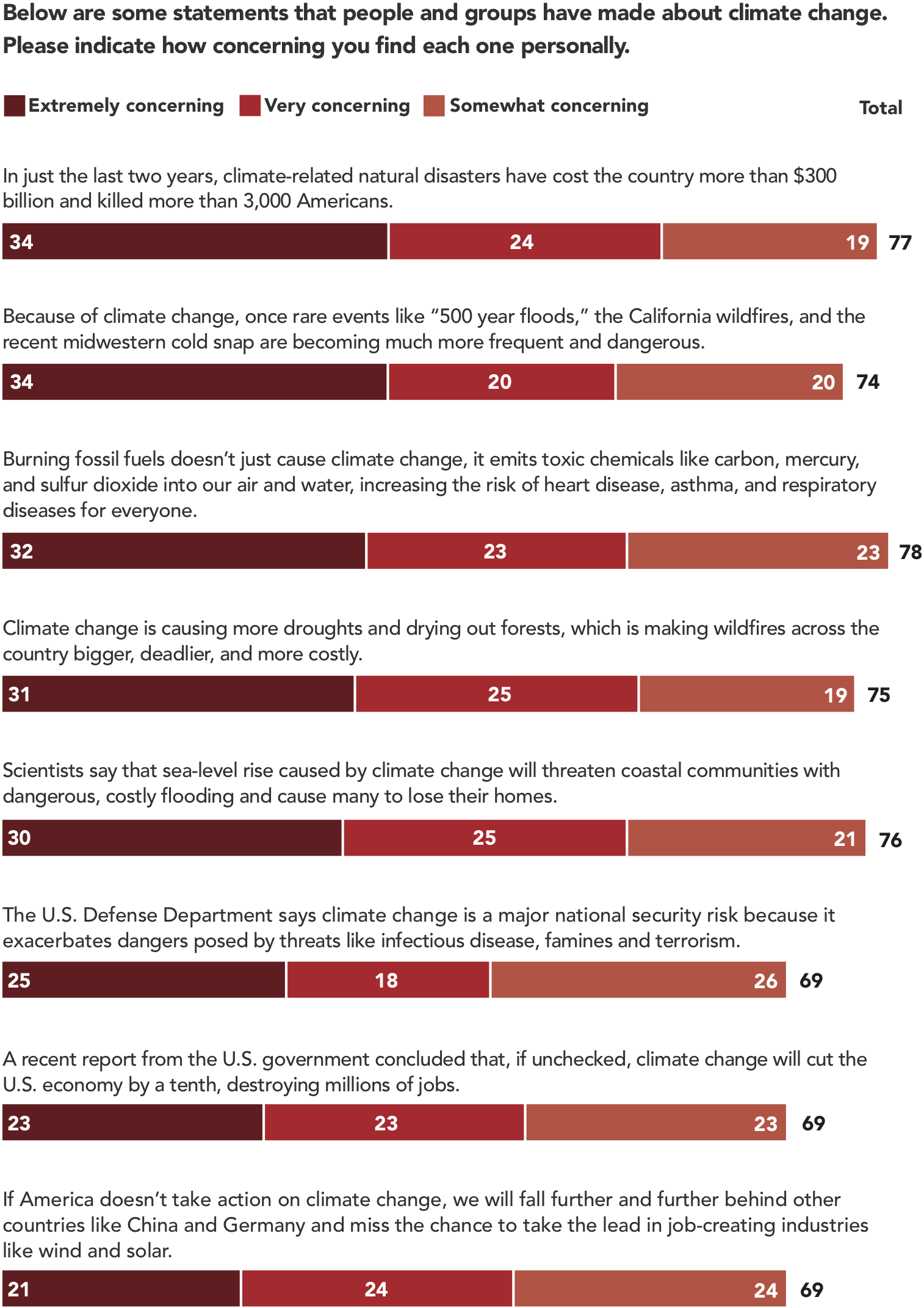
2 | Return of the Red Scare
Americans will respond best when leaders focus on the direct consequences of climate change.
“Socialism” attacks against progressive policy are nothing new. Conservatives have called everything from Social Security to public education “socialism” going back to the Cold War. There is reason they make the attack, because Americans remain negative towards socialism overall. However, the 51% of Americans who express some concern about the Democratic Party moving too far in a socialist direction are mostly Republicans. Navigator finds that Democrats and independents are more concerned about the party moving too far in a liberal direction than a socialist direction.
There are also progressive messages that effectively disarm conservative charges of socialism. Each progressive message was paired against the conservative argument that Democrats want to bring Venezuela-style socialism to America. The most effective ones connect progressivism with popular public programs, remind Americans of conservatives’ continued attempts to undermine those programs and/or make a counterargument that conservatives are the ones with a failed approach to American capitalism.
“Democratic” Socialism?
In a split-sample experiment, half of respondents were asked to rate their impressions of “Socialism” and the other half were asked about “Democratic Socialism.” Adding this qualifier improves favorability from net -39 (21% favorable, 60% unfavorable) for “Socialism” to -18 (29% to 47%), still well underwater.
When paired against the conservative socialism smear, several arguments tested in the latest edition of Navigator win the debate.
Attacking out-of-touch conservative plans – like tax breaks to the rich that come at the expense of the middle class – bests the socialism argument by 8 points overall (54%-46%), and results in an effective tie among white non-college educated voters (51%-49%). Another argument that bests the conservative attack by 54% to 46%, and 63% to 37% among independents, reminds Americans that “socialism” name-calling is nothing more than “crying wolf” after the same attacks were deployed against progressive reforms for generations. Some progressive responses are less effective. When the counterargument focuses on Donald Trump’s own relationship with dictators in Russia and socialist North Korea, the public is divided 50%-50%. A separate counterargument focused on calls of socialism as a “desperate attempt by Donald Trump to distract from his own problems,” performs well with the public overall (55%-45%), but less so with independents (46% to 54%).
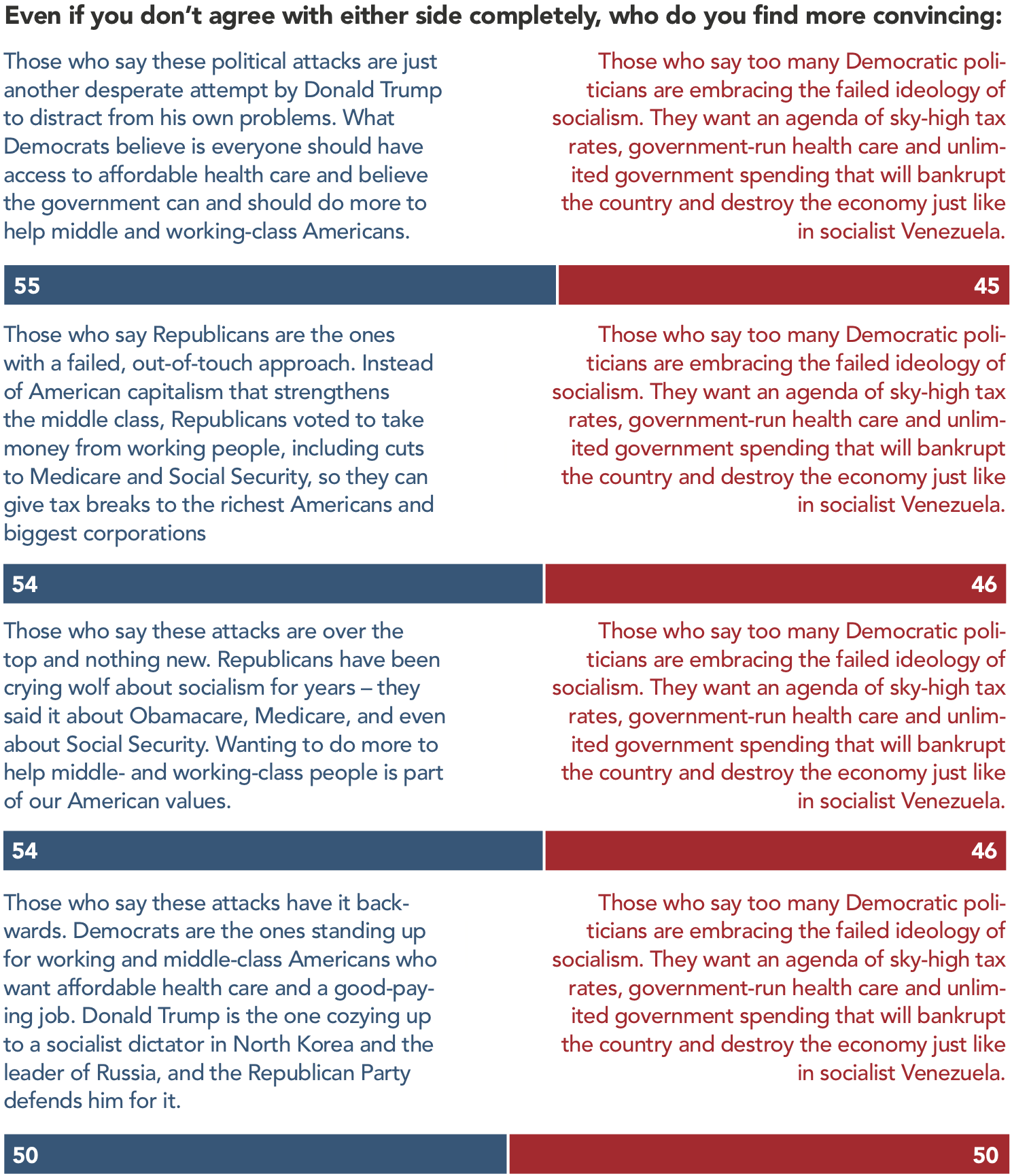
“Socialism” is not popular, but conservatives run the risk of attacking progressive policies that are.
The right focuses on labels like socialism rather than the underlying policies because the underlying policies are generally popular – even those labelled as “socialist”.
Navigator tested this using a split-sample experiment in which half of respondents were asked if items from a menu of policy goals constituted an “example of socialism.” The other half of respondents received a different question, simply asking if they support or oppose the policy.
As demonstrated in the graph, policies conservatives have associated with socialism, such as Social Security and a fossil fuel regulations, are two of the least likely to be considered as “examples of socialism” and also garner significant popular support. At the same time, a policy proposal like creating and funding a universal health care system is supported by a majority of Americans despite six in ten Americans considering the proposal to be an example of socialism.
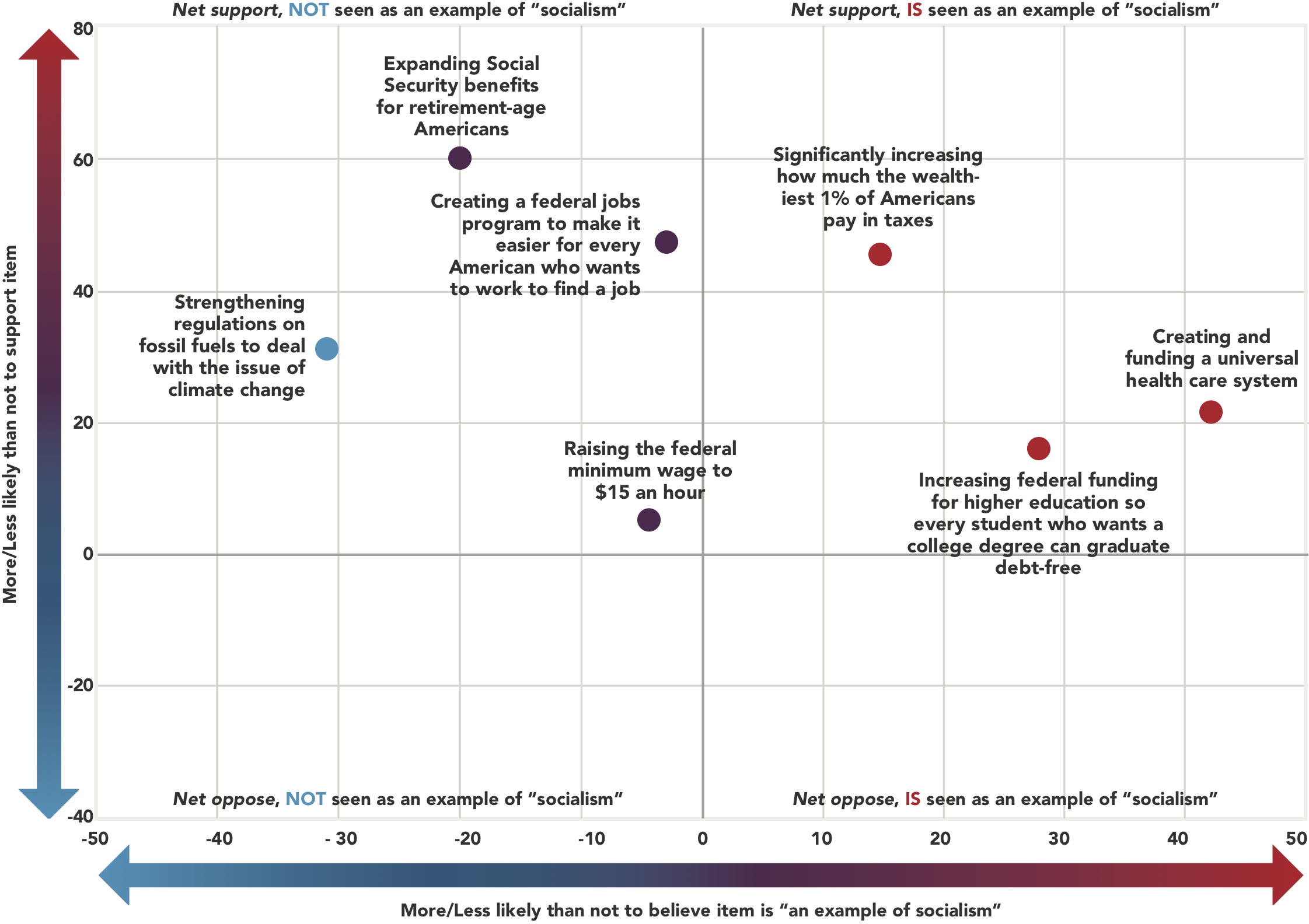
Bonus Points
Voters overwhelming see Trump as in it for Trump, not in it for them.
- This month, just 38% believe the president generally does what’s best for the country, a new low and a 6-point decline from December. 62% now tend to say the president puts himself first.
- Perception of Trump as self-interested has grown more rapidly than overall disapproval.

Support for Special Counsel investigation as high as ever.
- As Special Counsel Robert Mueller’s investigation into the the 2016 Trump campaign and Russia’s possible involvement winds down, support for the probe has reached an all-time high of 58%.

Americans file their dissatisfaction with the Republican tax plan.
- With tax filing season underway, the Republican tax law is at a low ebb. This month, 35% express support and 43% express opposition to the tax plan that passed Congress at the end of 2017. There is a strong divide in support by income, though no income range has a majority of support for the law: those making less than $50,000 a year are opposed by a 21-point margin, while middle-income Americans are split and wealthier Americans are marginally net supportive.

Fox News Channel: Preaching to the Choir
- Fox News Channel is at the heart of the conservative media ecosystem – Trump’s favorite channel to watch and appear for interviews. 38% of Republicans call it their “main source of news,” beating any other news source besides local TV (also at 38%).
- However, progressives can take heart that the channel’s brand is also highly partisan: with an overall favorability rating of -11 (38% favorable to 49% unfavorable), it is significantly underwater with both Democrats (19%-73%) and independents (30%-55%). Only Republicans are favorable on net (64%-19%).
Stay tuned for a special release from Navigator delving deeper into the rightwing echo chamber, and what it means for progressives.
About The Study
Global Strategy Group conducted a public opinion survey among a sample of 1,001 registered voters between March 1-4, 2019. The survey was conducted online, recruiting respondents from multiple opt-in online panel vendors. Respondents were verified against a voter file and special care was taken to ensure that the demographic composition of our sample matched that of the national registered voter population across a variety of demographic variables.

